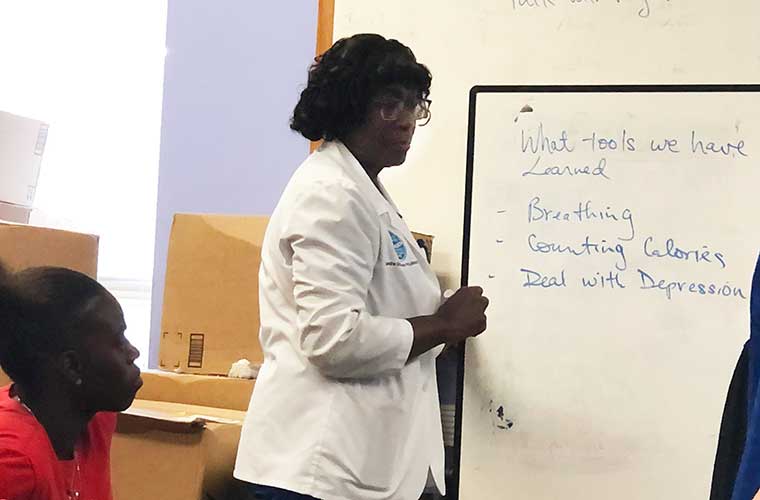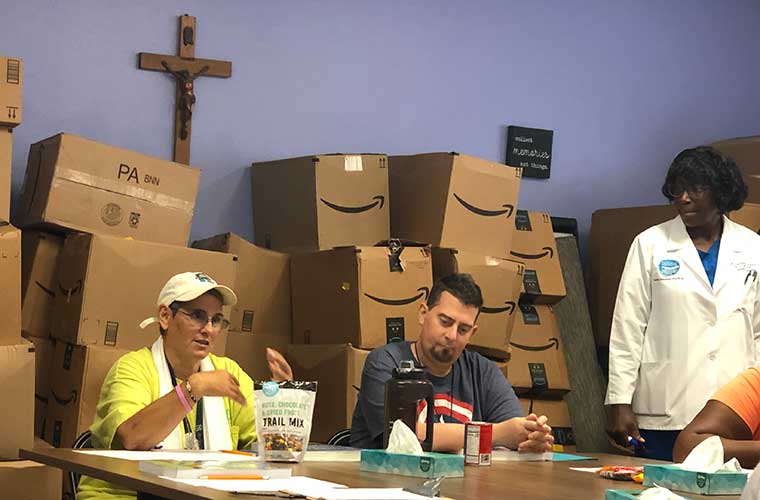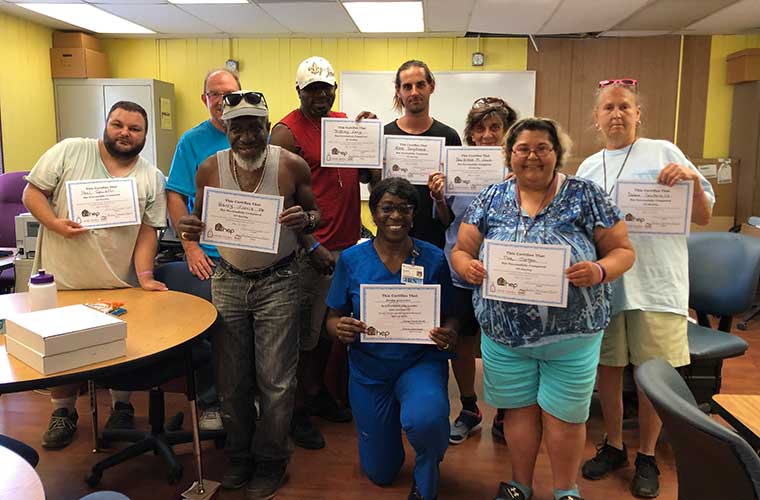St. Anthony's Helps People Without Permanent Housing Cope With Chronic Illnesses

Justin Schultz used to own a business selling toner cartridges. But when he received a diagnosis of end-stage liver failure about 2½ years ago, the disease and medical bills both took their toll. He couldn’t work because he was ill and then he lost his home.
“I was staying in hotels and motels for a while but then the money ran out,” said Schultz who is grateful to have found Pinellas Hope, an emergency shelter for those without permanent housing. That’s how he started attending the Go Healthy class, a program presented by St. Anthony’s Hospital, designed to provide coping skills for people with chronic illnesses.
“(The class) has provided me with several ways to cope with what I’m dealing with,” said Schultz, who is hoping to move into an apartment soon. “I try to stay positive as I wait to see about a transplant.”
Sandra Grosvenor, who leads the class, is a registered nurse and the outreach program coordinator for St. Anthony’s at Pinellas Hope. The facility is operated by Catholic Charities in Clearwater. Recently, on the final day of the six-week course, she asked participants what they had done in the previous week to be a little healthier, both mentally and physically.
“I did not drink soda,” one said. Another worked to get a job even though she had been rejected twice before. One participant meant to finish a book but then decided to read another.
“I wanted to read for an hour but I didn’t quite make it,” said another.

For the group that is learning how to manage the pain and emotions of chronic illness coupled with a lack of permanent housing, there is no shame or blame. It’s considered a win if they think about goals and how to attain them. This class is all about sharing and learning to cope in different ways when dealing with their illnesses.
“It’s important to sometimes redirect your thoughts and the program shows how that can help when dealing with a long-term illness,” Grosvenor said.
Stanford University which designed the Chronic Disease Self-Management Program (CDSMP), or Go Healthy as it is called here, said “it specifically addresses arthritis, diabetes and lung and heart disease, but teaches skills useful for managing a variety of chronic diseases.”
Created in the mid-1990s, the course provides tips and skills to support healthy choices, such as:
- Techniques to deal with problems associated with chronic disease
- Exercise and use of medications
- Making better nutrition choices
- Effective communication with family, friends and health providers
- Evaluating new treatments
- Making plans for the future

One of the ways to deal with problems associated with illness is through diversion. During the final class, Ashley Scott, a Catholic Charities employee who was training with Sandra to become a program leader, read a calming story as participants were encouraged to close their eyes and breathe deeply. This diversionary tactic can be used in the event of an anxiety attack, anger or if they are in pain.
“The program teaches relaxing techniques to calm down in stressful situations,” Grosvenor said. “If they are in pain, we teach them breathing exercises to help. Many of them really would rather find a different way to handle the pain rather than always reaching for medication.”
For Caroline Davis, who has been diagnosed with depression, post-traumatic stress disorder and is bipolar, the class has been helpful. She and her dog were living in a house but when she was evicted, she had nowhere to go and she had to leave her dog with friends.
“Some of what you learn in the class is common sense,” said Davis, who has been at Pinellas Hope for about three months as she studies to become a medical coder and biller. “But the program also gives me coping skills to find a way to deal with my illnesses. And the class has given me confidence. I want to get an apartment, get my coding license and get my dog back.”
While a program like this is usually held in community settings such as senior centers, churches, libraries and hospitals, Sandra said that she wanted to bring it to the clients she works with each day.
“I just knew that this program would be helpful to them,” said Grosvenor, who has been working at Pinellas Hope for about five years. She directs the BayCare Medical Respite Program at Pinellas Hope. The respite provides housing, medications and other health care services to support patients’ recovery. After being discharged from one of four BayCare hospitals – St. Anthony’s, Morton Plant, Mease Countryside and Mease Dunedin – patients who do not have permanent housing can go to the respite to receive additional care.
“This might not be the typical place for the classes but it’s a perfect way to meet them where they are,” Grosvenor said.
St. Anthony’s wants to expand the classes through the Faith Community Nursing program. “We want to make sure that this useful information gets to as many people in our community as possible,” said Sr. Mary McNally, St. Anthony’s vice president of mission. “Our guiding principle is to provide quality health care to our community. This is just one way for us to fulfill our mission.”
Grosvenor plans to begin her third series of classes soon. And everyone who graduated from this series is welcome to come back. “Sandra is just awesome,” Schultz said. “I’d be happy to come back and share my experiences with the new group.”
